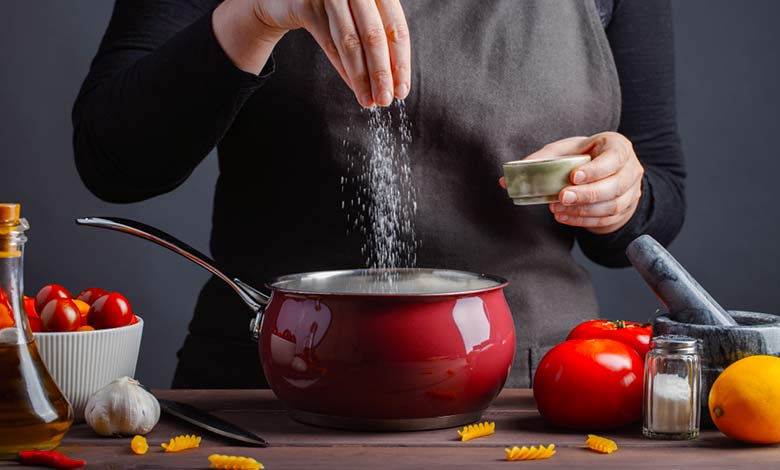
There are different types of salt, but people use sodium chloride for food or cooking. We use sodium and chloride ions to keep our cells inflated, regulate blood pressure, and convey electrical nerve impulses throughout the body. We must consume about 6 grams of sodium chloride daily to maintain it. Sodium chloride can chemically block bitter taste receptors and amplify the senses.
Why does salt make food taste better? (Biological Process)
Salt enhances the flavor of food and makes it taste better due to its interaction with our taste buds and the way it affects our perception of flavors. Here are the primary reasons why salt improves the taste of food:
Enhances Flavor Perception: Salt can improve the perception of other flavors in food. It interacts with taste receptors on our tongue, primarily those responsible for detecting sweetness and umami (savory) flavors. By stimulating these receptors, salt can amplify the taste and intensity of other flavors in the food, making them more pronounced and enjoyable.
Balances and Rounds Out Flavors: Salt acts as a flavor balancer, helping to harmonize and balance the taste profile of a dish. It can counteract bitterness and enhance the perception of sweetness, thereby creating a more well-rounded and satisfying flavor experience. Salt can also help to bring out ingredients’ natural flavors and make them more prominent.
Increases Salivation: Salt stimulates salivation, which aids in the breakdown and digestion of food. Increased salivation can contribute to a more pleasurable eating experience by moistening the mouth, improving texture perception, and enhancing the overall flavor release.
Preserves and Adds Depth: Salt has long been used as a natural preservative to inhibit the growth of bacteria and extend the shelf life of food. This preservation property can help maintain the freshness and quality of ingredients, ensuring that flavors are preserved over time. Additionally, salt can add depth and complexity to dishes, intensifying flavors and creating a more satisfying culinary experience.
To have a salty taste, you have to have sodium ions present. When sodium ions are present inside the mouth, it finds gustatory cells to let sodium in. These gustatory cells have special channels that let sodium enter the cell.
When sodium enters any cell in the body, it will cause the polarity to go more positively or toward zero. It happens with a voltage change and action potentials. So once a greater potential happens, the voltage-gated sodium channel will open, letting more sodium diffuse. After that, a voltage-gated calcium channel will open, letting calcium diffuse.
When calcium comes into a cell, it causes vast changes. It will bind to vesicles containing ATP, and it’ll cause their snare proteins to be active. The calcium will also buy snare proteins on the edge of the gustatory cell and activate those snare proteins.
The snare proteins of the gustatory cell will intermingle to fuse the vesicle and the gustatory cell membranes. It will result in dumping the ATP molecules outside the gustatory cell.
When the ATP contacts that neuron, it is triggered to create an action potential, which then travels to the gustatory cortex of the brain. It tells you that you are eating a bunch of salt. The taste buds then feel salty, which helps to release serotonin. Serotonin is responsible for feeling good. So salty food tastes better for this.
Saltiness is one of the five primary basic tastes the human tongue can detect. Salt, bitter, sweet, sour, and umami are those five tastes. If you’re unfamiliar with this one, it is from glutamic acid in many foods, particularly some meats. Also, it is the basis of the flavor enhancer. Monosodium glutamate is known as MSG. It is a flavor enhancer for cranking the sensational umami flavors on our tongues.
The extra salt has other effects outside of simply making things saltier. Mainly adding salt to foods helps with specific molecules in those foods more easily released into the air. Thus it helps the aroma of the food, which is essential in our perception of taste. Adding salt won’t increase salty taste perception and suppress bitter taste perception in any food. It helps balance the taste a bit by making the perceived flavor.
Read more:

